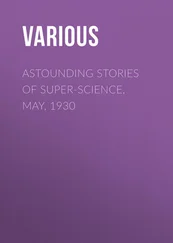Various - Stories Worth Rereading
Здесь есть возможность читать онлайн «Various - Stories Worth Rereading» — ознакомительный отрывок электронной книги совершенно бесплатно, а после прочтения отрывка купить полную версию. В некоторых случаях можно слушать аудио, скачать через торрент в формате fb2 и присутствует краткое содержание. Жанр: foreign_sf, на английском языке. Описание произведения, (предисловие) а так же отзывы посетителей доступны на портале библиотеки ЛибКат.
- Название:Stories Worth Rereading
- Автор:
- Жанр:
- Год:неизвестен
- ISBN:нет данных
- Рейтинг книги:5 / 5. Голосов: 1
-
Избранное:Добавить в избранное
- Отзывы:
-
Ваша оценка:
- 100
- 1
- 2
- 3
- 4
- 5
Stories Worth Rereading: краткое содержание, описание и аннотация
Предлагаем к чтению аннотацию, описание, краткое содержание или предисловие (зависит от того, что написал сам автор книги «Stories Worth Rereading»). Если вы не нашли необходимую информацию о книге — напишите в комментариях, мы постараемся отыскать её.
Stories Worth Rereading — читать онлайн ознакомительный отрывок
Ниже представлен текст книги, разбитый по страницам. Система сохранения места последней прочитанной страницы, позволяет с удобством читать онлайн бесплатно книгу «Stories Worth Rereading», без необходимости каждый раз заново искать на чём Вы остановились. Поставьте закладку, и сможете в любой момент перейти на страницу, на которой закончили чтение.
Интервал:
Закладка:
"The day for the raising came, the first in that part of the country to be conducted on temperance principles. There were no telephones to spread the news, but long before the day arrived, everybody, far and near, knew that Jotham Hobbs was going to raise his new house without rum. The people came, some eager to help to establish the era of temperance, and some secretly hoping that the project would fail. A generous dinner was cooking indoors; for the host intended to refuse his guests nothing that was good. The song of mallets and hammers rang out, and the timbers began to come together; but the master framer was idle. Over by the old house door sat grandfather. He positively refused to lend a hand to the enterprise unless treated to his rum. For a time the work progressed rapidly; then there came a halt. There was a place where the timbers would not fit. After much delay and many vain attempts to go on with the work, father asked grandfather to help; but he only shook his head, and grimly replied that it was ten to one if it ever came together without rum. There were more vain attempts, more delays. Finally, father, seeing that he must yield or give up the work, got some rum and handed it to grandfather. The old man gravely laid aside his pipe, drank the Medford, and walked over to the men. He took a tenon marked ten and placed it in a mortise marked one . The problem was solved. He had purposely marked them in that way, instead of marking them alike, as was customary. With a sly twinkle in his eye he said, 'I told you it was ten to one if it ever came together.'
"But the cause of temperance had come to stay, and grandfather met his Waterloo when Squire Low built his one-hundred-foot barn. Three hundred men were there to see that it went up without rum. Grandfather and a kindred spirit, Old Uncle Benjamin Burrill, stood at a safe distance, hoping to see another failure. But section after section was raised. The rafters went on, and finally the ridge-pole. The old men waited to see no more. They dropped their heads, turned on their heels, and walked away."
These events occurred between 1830 and 1840. Since then the cause of temperance has made rapid progress.
In the State Capitol at Augusta, Maine, is a petition sent to the legislature in 1835 by one hundred and thirty-nine women of Brunswick, Maine. It is a plea for a prohibitory law, and is, probably, the first attempt made to secure a legislative enactment against the liquor traffic. One paragraph, which is characteristic of the whole document, is worth quoting:—
"We remonstrate against this method of making rich men richer and poor men poorer; of making distressed families more distressed; of making a portion of the human family utterly and hopelessly miserable, debasing the moral nature, and thus clouding with despair their temporal and future prospects."
This petition met with no recognition by that legislature. There were many customs to be laid aside, many prejudices to be overcome, and it was not till 1851 that Maine became a prohibition State. Since that time her health and wealth have steadily increased, in greater proportion than other States which have not adopted temperance principles; and public sentiment, which is a powerful ally, is against the liquor traffic.
ETHEL HOBBS WALTERS.
WHAT RUM DOES
I was sitting at my breakfast-table one Sunday morning, when I was called to my door by the ringing of the bell. There stood a boy about fourteen years of age, poorly clad, but tidied up as best he could. He was leaning on crutches; for one leg was off at the knee.
In a voice trembling with emotion, and with tears coursing down his cheeks, he said: "Mr. Hoagland, I am Freddy Brown. I have come to see if you will go to the jail and talk and pray with my father. He is to be hanged tomorrow for the murder of my mother. My father was a good man, but whisky did it. I have three little sisters younger than myself. We are very, very poor, and have no friends. We live in a dark and dingy room. I do the best I can to support my sisters by selling papers, blacking boots, and doing odd jobs; but Mr. Hoagland, we are very poor. Will you come and be with us when father's body is brought home? The governor says we may have his body after he is hanged."
I was deeply moved to pity. I promised, and made haste to the jail, where I found his father.
He acknowledged that he must have murdered his wife, for the circumstances pointed that way, but he had not the slightest remembrance of the deed. He said he was crazed with drink, or he never would have committed the crime. He said: "My wife was a good and faithful mother to my little children. Never did I dream that my hand could be guilty of such a crime."
The man could bravely face the penalty of the law for his deed, but he broke down and cried as if his heart would break when he thought of leaving his children in a destitute and friendless condition. I read and prayed with him, and left him to his fate.
The next morning I made my way to the miserable quarters of the children. I found three little girls upon a bed of straw in one corner of the room. They were clad in rags. They would have been beautiful girls had they had the proper care. They were expecting the body of their dead father, and between their cries and sobs they would say, "Papa was good, but whisky did it."
In a little time two strong officers came bearing the body of the dead father in a rude pine box. They set it down on two old rickety stools. The cries of the children were so heartrending that the officers could not endure it, and made haste out of the room.
In a moment the manly boy nerved himself, and said, "Come, sisters, kiss papa's face before it is cold." They gathered about his face and smoothed it down with kisses, and between their sobs cried out: "Papa was good, but whisky did it! Papa was good, but whisky did it!"
I raised my heart to God and said, "O God, did I fight to save a country that would derive a revenue from a traffic that would make a scene like this possible?"— Youth's Outlook .
MY MOTHER'S RING
I am living now on borrowed time. The sun of my allotted life-day has set, and with the mellow twilight of old age there come to my memory reflections of a life which, if not well spent, has in it enough of good at least to make these reflections pleasant. And yet, during all the years in which I have responded to the name Carter Brassfield, but a single fortnight of time, it seems to me, is worth recounting.
We were living in Milwaukee, having recently moved there from York State, where I was born. My father, a bookkeeper of some expertness, not securing a position in our newly adopted city as soon as he had expected, became disheartened, and, to while away the time that hung so heavily, took to drinking beer with some newly acquired German friends. The result was that our funds were exhausted much sooner than they should have been, and mother took it upon herself to turn bread-winner for the family by doing some plain sewing.
A small allotment of this money she gave to me one day on my return from school, and sent me to Mr. Blodget, the grocer, to purchase some supplies. After giving my order to one of the clerks I immediately turned my attention to renewing my acquaintance with Tabby, the store cat.
While I was thus engaged, I heard my name repeated by a stranger who was talking with Mr. Blodget, and erelong the man sauntered over, spoke to me, and after some preliminary remarks asked if I was Carter Brassfield. He was dark, had a sweeping mustache, and wore eye-glasses. Upon being assured that I was Carter Brassfield, he took from his pocket a gold ring, and, turning it around carefully in the light, read the inscription on its inner side.
"Is your mother's name Alice?" he asked.
Читать дальшеИнтервал:
Закладка:
Похожие книги на «Stories Worth Rereading»
Представляем Вашему вниманию похожие книги на «Stories Worth Rereading» списком для выбора. Мы отобрали схожую по названию и смыслу литературу в надежде предоставить читателям больше вариантов отыскать новые, интересные, ещё непрочитанные произведения.
Обсуждение, отзывы о книге «Stories Worth Rereading» и просто собственные мнения читателей. Оставьте ваши комментарии, напишите, что Вы думаете о произведении, его смысле или главных героях. Укажите что конкретно понравилось, а что нет, и почему Вы так считаете.












